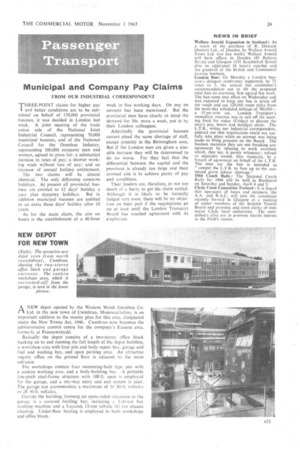Municipal and Company Pay Claims
Page 41

If you've noticed an error in this article please click here to report it so we can fix it.
FROM OUR INDUSTRIAL CORRESPONDENT
THREE-POINT claims for higher pay I and better conditions are to be submitted on behalf of 170,000 provincial busmen, it was decided in London last week. A joint meeting of the trade union side of the National Joint Industrial Council, representing 70,000 municipal busmen, and of the National Council for the Omnibus Industry, representing 100,000 company men and women, agreed to press for: a substantial increase in rates of pay; a shorter working week without loss of pay; and an increase of annual holiday entitlement.
The two claims will be almost identical. The only difference concerns holidays. At present all provincial busmen are entitled to 12 days' holiday a year plus statutory holidays. But in addition municipal busmen are entitled to an extra three days' holiday after 10 years.
As for the main claim, the aim on hours is the establishment of a 40-hour
week in five working days. On pay no amount has been mentioned. But the provincial men have clearly in mind the demand for 30s. more a week, put in by their London colleagues.
Admittedly the provincial busmen cannot plead the same shortage of staff, except possibly in the Birmingham area. But if the London men are given a sizeable increase they will be determined to do no worse. For they feel that the differential between the capital and the provinces is already too large and their avowed aim is to achieve parity of pay and conditions.
Their leaders are, therefore, in not too much of a hurry to get the claim settled. Although it is likely to be formally lodged very soon, there will be no objecCon oil their part if the negotiations go on at least until the London Transport Board has reached agreement with its emplos ces.




































































































